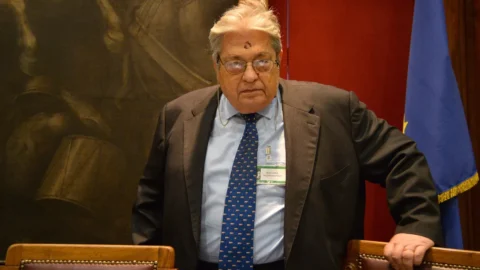Never as in these days, close to the vote on Tuesday 8 November, the outcome of the American presidential elections is uncertain, very uncertain. It will be for the emailgate case (even if many pollsters swear no), it will be more likely because there is a deep America, very far from what we perceive on this side of the Atlantic, which like Europe is not spared from populist anger and who will therefore have no problem voting for Donald Trump, the candidate who most worries the markets and the international community. But is Trump really that dangerous? And what would happen, however, in the event of a victory - no longer so obvious - for Hillary Clinton? To explain it to FIRSTonline is Stefano Silvestri, director of AffarInternazionali.it and scientific advisor of the Istituto Affari Internazionali, of which he was also president.
“The problems for Clinton could come after the vote: the scandals that are engulfing her will not be enough for an impeachment but they could annoy her, especially with a Republican-majority Congress”, explains Silvestri who speaks of a possibly “halved” president. But she is still better than an unpredictable president like Trump: the predictability element is fundamental, especially for the markets”.
Let's start with domestic politics, or the field where there is the greatest difference between the two candidates for the White House.
"From this point of view, the two candidates respect the traditions of their parties: more public spending and more taxes, especially on high incomes, for Hillary, while Trump would like to abolish both and concentrate public resources on security".
On international trade relations, on the other hand, the two positions are similar.
“Yes, even if the Sanders effect weighs on the Democratic candidate, who made opposition to NAFTA (North America Free Trade Agreement) and TTIP two battle horses particularly appreciated in the electoral campaign. Clinton is riding them, but in the end I think he will have a moderate attitude, also because we just recently heard Obama himself insisting with Renzi on the TTIP. In any case, the former First Lady will be less protectionist than her rival, who instead looks only within the domestic borders, on this one of hers as on other issues ”.
Which?
“Security and foreign policy. Trump has repeatedly criticized even NATO, believing that the US gives this organization more than it receives in return. But this is profoundly false: NATO costs the US, it is true, but it gives them a much greater benefit than what they would have if it weren't there. In general, the Republican candidate has a more bilateral view of relations, based on the sympathy or convenience of the moment. He winked at Putin, even at North Korea, but there is no political strategy. Even on security, the vision is closely linked to what is happening inside the United States".
While Clinton…
“While Clinton has a more global vision and therefore his election would be more reassuring in the face of major international conflicts. In the Middle East I can't say how it would behave, it could opt for a hard line or for long negotiations, but in any case there will be a strategy. Trump, on the other hand, could even ignore it and aim for a quick fix, to a quick solution perhaps by delegating the action to an ally, which can be Saudi Arabia, Turkey, or why not Iran, if it suits them at the time. I believe that any of Trump's options would be more destabilizing as they are only supported by personalistic or interest-related logics".
Apparently Trump would also be destabilizing for the financial markets. This has been understood in these months of the campaign and tradition also says it, which has always seen Democratic presidents have more chemistry with Wall Street, most recently with Obama but even more so in the times of Bill Clinton, Hillary's husband. Does the fact that hedge funds and private equity funds have contributed $56 million to Hillary's campaign and only $243 to her opponent's campaign?
“It could be, even if, on the other hand, the democratic candidate has repeatedly expressed her intention to tax financial income more. But this will not displease the markets too much, first of all because we need to see if and when it will do it, and secondly because for the stock exchanges the first factor is stability. With Hillary Clinton in the White House they would have a predictable, calculable point of reference. Trump's problem is that we don't know exactly what he will do, he will limit himself to riding populist impulses and this is the worst thing for American and international finance. And it is also the reason why, if elected, Trump will have less difficulty than his opponent in governing even with a weak majority in Congress or with a divided Parliament: apart from a couple of urgent interventions, such as presumably taxes and internal security, Trump does not have great reformist ambitions".
What would be the scenarios with one or the other president in relations with Europe?
“Europe has a strong need for the United States, indeed I believe that we should make more efforts to guarantee the support and presence of the United States. For this reason we would be decidedly more relaxed with Clinton, because Trump does not like multilateral relations: as I said, he prefers to personalize relations and this would not benefit the US-EU axis ”.
It's Italy?
“We'll see what happens in the UK, however with Brexit Italy would become an increasingly key country in Europe and therefore increasingly interesting for the United States. If Hillary wins, she would continue on the line traced by Obama, which is the same as Bill Clinton's, namely that of seeking synergies between international democratic leaders. Clinton did it with Blair, Obama did it recently with Renzi and Canadian Prime Minister Trudeau, I think Hillary would continue in this vein”.
What if Trump wins instead?
“I'm making a provocation: we just have to propose Silvio Berlusconi as ambassador to Washington. A nice axis could be created with Trump, Putin and why not Erdogan. That's obviously a joke, but it's the only possible relationship I can think of if the Republican candidate were to occupy the White House."





